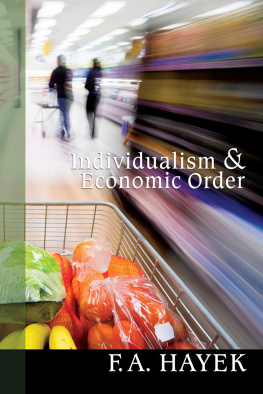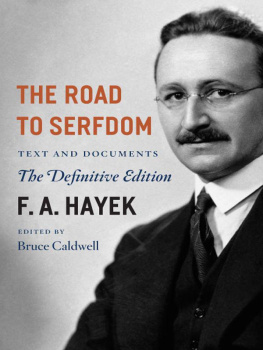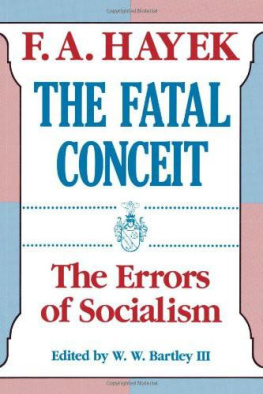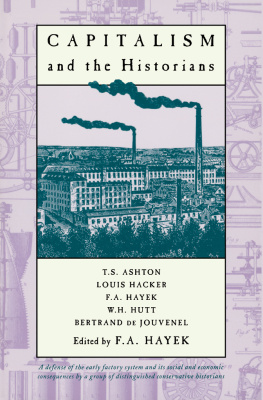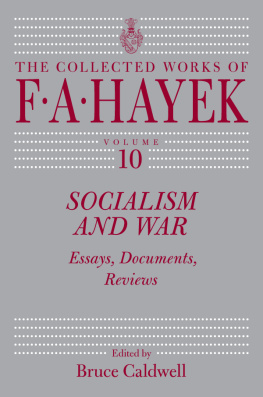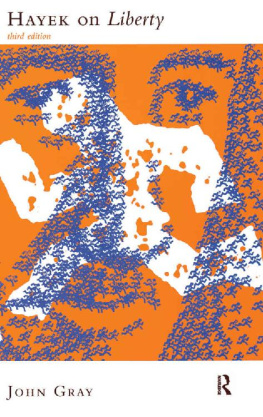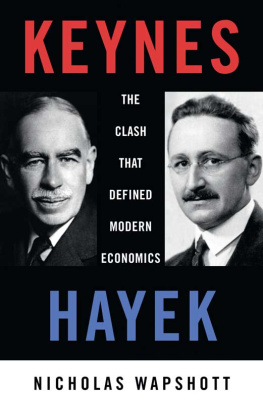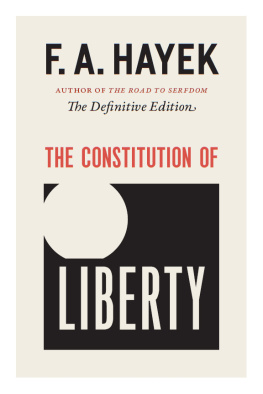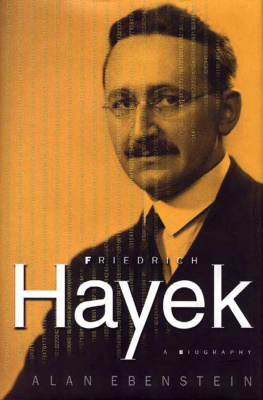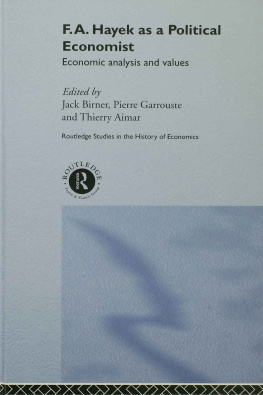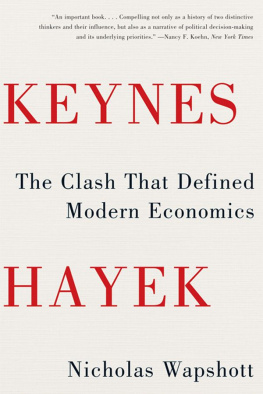F. A. Hayek - 1948
Here you can read online F. A. Hayek - 1948 full text of the book (entire story) in english for free. Download pdf and epub, get meaning, cover and reviews about this ebook. year: 1948 (2013), publisher: Ludwig van Mises Institute, genre: Politics. Description of the work, (preface) as well as reviews are available. Best literature library LitArk.com created for fans of good reading and offers a wide selection of genres:
Romance novel
Science fiction
Adventure
Detective
Science
History
Home and family
Prose
Art
Politics
Computer
Non-fiction
Religion
Business
Children
Humor
Choose a favorite category and find really read worthwhile books. Enjoy immersion in the world of imagination, feel the emotions of the characters or learn something new for yourself, make an fascinating discovery.
1948: summary, description and annotation
We offer to read an annotation, description, summary or preface (depends on what the author of the book "1948" wrote himself). If you haven't found the necessary information about the book — write in the comments, we will try to find it.
1948 — read online for free the complete book (whole text) full work
Below is the text of the book, divided by pages. System saving the place of the last page read, allows you to conveniently read the book "1948" online for free, without having to search again every time where you left off. Put a bookmark, and you can go to the page where you finished reading at any time.
Font size:
Interval:
Bookmark:
W HAT is the problem we wish to solve when we try to construct a rational economic order? On certain familiar assumptions the answer is simple enough. If we possess all the relevant information, if we can start out from a given system of preferences, and if we command complete knowledge of available means, the problem which remains is purely one of logic. That is, the answer to the question of what is the best use of the available means is implicit in our assumptions. The conditions which the solution of this optimum problem must satisfy have been fully worked out and can be stated best in mathematical form: put at their briefest, they are that the marginal rates of substitution between any two commodities or factors must be the same in all their different uses.
This, however, is emphatically not the economic problem which society faces. And the economic calculus which we have developed to solve this logical problem, though an important step toward the solution of the economic problem of society, does not yet provide an answer to it. The reason for this is that the data from which the economic calculus starts are never for the whole society given to a single mind which could work out the implications and can never be so given.
The peculiar character of the problem of a rational economic order is determined precisely by the fact that the knowledge of the circumstances of which we must make use never exists in concentrated or integrated form but solely as the dispersed bits of incomplete and frequently contradictory knowledge which all the separate individuals possess. The economic problem of society is thus not merely a problem of how to allocate given resourcesif given is taken to mean given to a single mind which deliberately solves the problem set by these data. It is rather a problem of how to secure the best use of resources known to any of the members of society, for ends whose relative importance only these individuals know. Or, to put it briefly, it is a problem of the utilization of knowledge which is not given to anyone in its totality.
This character of the fundamental problem has, I am afraid, been obscured rather than illuminated by many of the recent refinements of economic theory, particularly by many of the uses made of mathematics. Though the problem with which I want primarily to deal in this paper is the problem of a rational economic organization, I shall in its course be led again and again to point to its close connections with certain methodological questions. Many of the points I wish to make are indeed conclusions toward which diverse paths of reasoning have unexpectedly converged. But, as I now see these problems, this is no accident. It seems to me that many of the current disputes with regard to both economic theory and economic policy have their common origin in a misconception about the nature of the economic problem of society. This misconception in turn is due to an erroneous transfer to social phenomena of the habits of thought we have developed in dealing with the phenomena of nature.
In ordinary language we describe by the word planning the complex of interrelated decisions about the allocation of our available resources. All economic activity is in this sense planning; and in any society in which many people collaborate, this planning, whoever does it, will in some measure have to be based on knowledge which, in the first instance, is not given to the planner but to somebody else, which somehow will have to be conveyed to the planner. The various ways in which the knowledge on which people base their plans is communicated to them is the crucial problem for any theory explaining the economic process, and the problem of what is the best way of utilizing knowledge initially dispersed among all the people is at least one of the main problems of economic policyor of designing an efficient economic system.
The answer to this question is closely connected with that other question which arises here, that of who is to do the planning. It is about this question that all the dispute about economic planning centers. This is not a dispute about whether planning is to be done or not. It is a dispute as to whether planning is to be done centrally, by one authority for the whole economic system, or is to be divided among many individuals. Planning in the specific sense in which the term is used in contemporary controversy necessarily means central planningdirection of the whole economic system according to one unified plan. Competition, on the other hand, means decentralized planning by many separate persons. The halfway house between the two, about which many people talk but which few like when they see it, is the delegation of planning to organized industries, or, in other words, monopolies.
Which of these systems is likely to be more efficient depends mainly on the question under which of them we can expect that fuller use will be made of the existing knowledge. This, in turn, depends on whether we are more likely to succeed in putting at the disposal of a single central authority all the knowledge which ought to be used but which is initially dispersed among many different individuals, or in conveying to the individuals such additional knowledge as they need in order to enable them to dovetail their plans with those of others.
It will at once be evident that on this point the position will be different with respect to different kinds of knowledge. The answer to our question will therefore largely turn on the relative importance of the different kinds of knowledge: those more likely to be at the disposal of particular individuals and those which we should with greater confidence expect to find in the possession of an authority made up of suitably chosen experts. If it is today so widely assumed that the latter will be in a better position, this is because one kind of knowledge, namely, scientific knowledge, occupies now so prominent a place in public imagination that we tend to forget that it is not the only kind that is relevant. It may be admitted that, as far as scientific knowledge is concerned, a body of suitably chosen experts may be in the best position to command all the best knowledge availablethough this is of course merely shifting the difficulty to the problem of selecting the experts. What I wish to point out is that, even assuming that this problem can be readily solved, it is only a small part of the wider problem.
Today it is almost heresy to suggest that scientific knowledge is not the sum of all knowledge. But a little reflection will show that there is beyond question a body of very important but unorganized knowledge which cannot possibly be called scientific in the sense of knowledge of general rules: the knowledge of the particular circumstances of time and place. It is with respect to this that practically every individual has some advantage over all others because he possesses unique information of which beneficial use might be made, but of which use can be made only if the decisions depending on it are left to him or are made with his active co-operation. We need to remember only how much we have to learn in any occupation after we have completed our theoretical training, how big a part of our working life we spend learning particular jobs, and how valuable an asset in all walks of life is knowledge of people, of local conditions, and of special circumstances. To know of and put to use a machine not fully employed, or somebodys skill which could be better utilized, or to be aware of a surplus stock which can be drawn upon during an interruption of supplies, is socially quite as useful as the knowledge of better alternative techniques. The shipper who earns his living from using otherwise empty or half-filled journeys of tramp-steamers, or the estate agent whose whole knowledge is almost exclusively one of temporary opportunities, or the arbitrageur who gains from local differences of commodity pricesare all performing eminently useful functions based on special knowledge of circumstances of the fleeting moment not known to others.
Font size:
Interval:
Bookmark:
Similar books «1948»
Look at similar books to 1948. We have selected literature similar in name and meaning in the hope of providing readers with more options to find new, interesting, not yet read works.
Discussion, reviews of the book 1948 and just readers' own opinions. Leave your comments, write what you think about the work, its meaning or the main characters. Specify what exactly you liked and what you didn't like, and why you think so.

